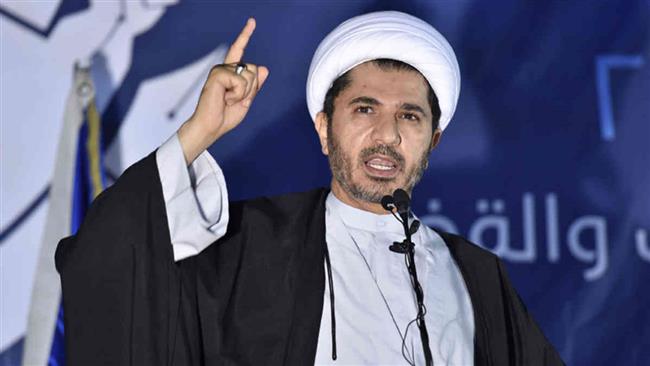
RNA - The scholars, in a statement released on Monday, decried the verdict issued against the 53-year-old secretary general of the dissolved al-Wefaq National Islamic Society and two of his colleagues, Hassan Sultan and Ali al-Aswad, stressing that “the governing dictatorial regime, having lost its legitimacy and suffered an array of failures as regards its endeavors to intimidate people and pressure their leaders to surrender, has become completely lost in its decisions and policies.”
“The Manama regime has opted to thread a dark tunnel leading to destruction, and this will only be to the benefit of Americans, Britons and Zionists. The unfair trials clearly proved to the world the politicization of Bahrain’s judiciary and its manipulation to sate the appetite of the kingdom’s rulers,” the statement pointed out.
The scholars then called on Al Khalifah regime to release all political prisoners, notably Sheikh Salman, emphasizing that such rulings will not affect public will and the nation’s legitimate demands, and will instead build up people’s resolve to tackle rampant injustice and corruption.
Meanwhile, the opposition al-Wafa Islamic Movement condemned the “unjust sentence” against Sheikh Salman, saying it “was a retaliatory measure and devoid of the most basic rules of justice”
“This verdict was passed under the guise of conspiracy and suspicious silence of Western powers, particularly the United States… It is a new nail in the coffin of the ruling gang,” Wafa stated.
Additionally, the Gulf Institute for Democracy and Human Rights described the life term given to Sheikh Salman and his two aides as “arbitrary and illegal.”
“The life sentences are nothing but revenge from the opposition in Bahrain because of its demands for political reforms and its refusal to bow down to the ruling regime. These rulings will only complicate Bahrain crisis, and deepen the rift between the opposition and the governing dynasty,” the institute highlighted.
On Sunday, an appellate court in Bahrain overturned the acquittal of Sheikh Salman and two of his colleagues, Hassan Sultan and Ali al-Aswad, and levied charges of collaborating with Qatar “with the purpose of overthrowing the regime” against them.
According to Press TV, the court went on to say that the trio had transferred confidential information to Qatar and received financial support in return. Sultan and Aswad were tried in absentia.
On June 21, the high criminal court in Bahrain had acquitted Sheikh Salman and his two aides of the spying charges.
Thousands of anti-regime protesters have held demonstrations in Bahrain on an almost daily basis ever since a popular uprising began in the country in mid-February 2011.
They are demanding that the Al Khalifah regime relinquish power and allow a just system representing all Bahrainis to be established.
Manama has gone to great lengths to clamp down on any sign of dissent. On March 14, 2011, troops from Saudi Arabia and the United Arab Emirates were deployed to assist Bahrain in its crackdown.
Scores of people have lost their lives and hundreds of others sustained injuries or got arrested as a result of the Al Khalifah regime’s crackdown.
On March 5, 2017, Bahrain’s parliament approved the trial of civilians at military tribunals in a measure blasted by human rights campaigners as being tantamount to imposition of an undeclared martial law countrywide.
847/940